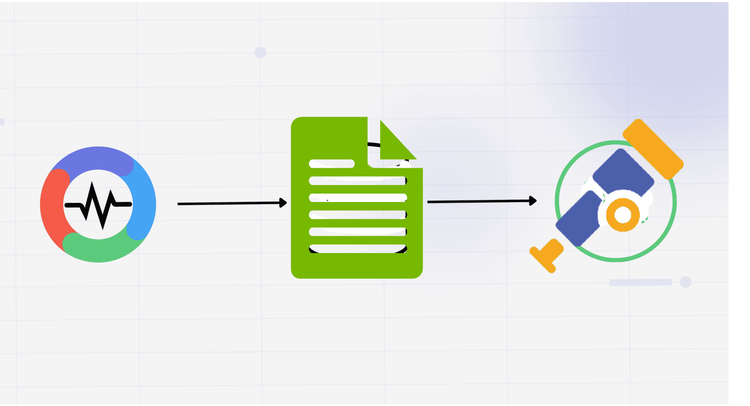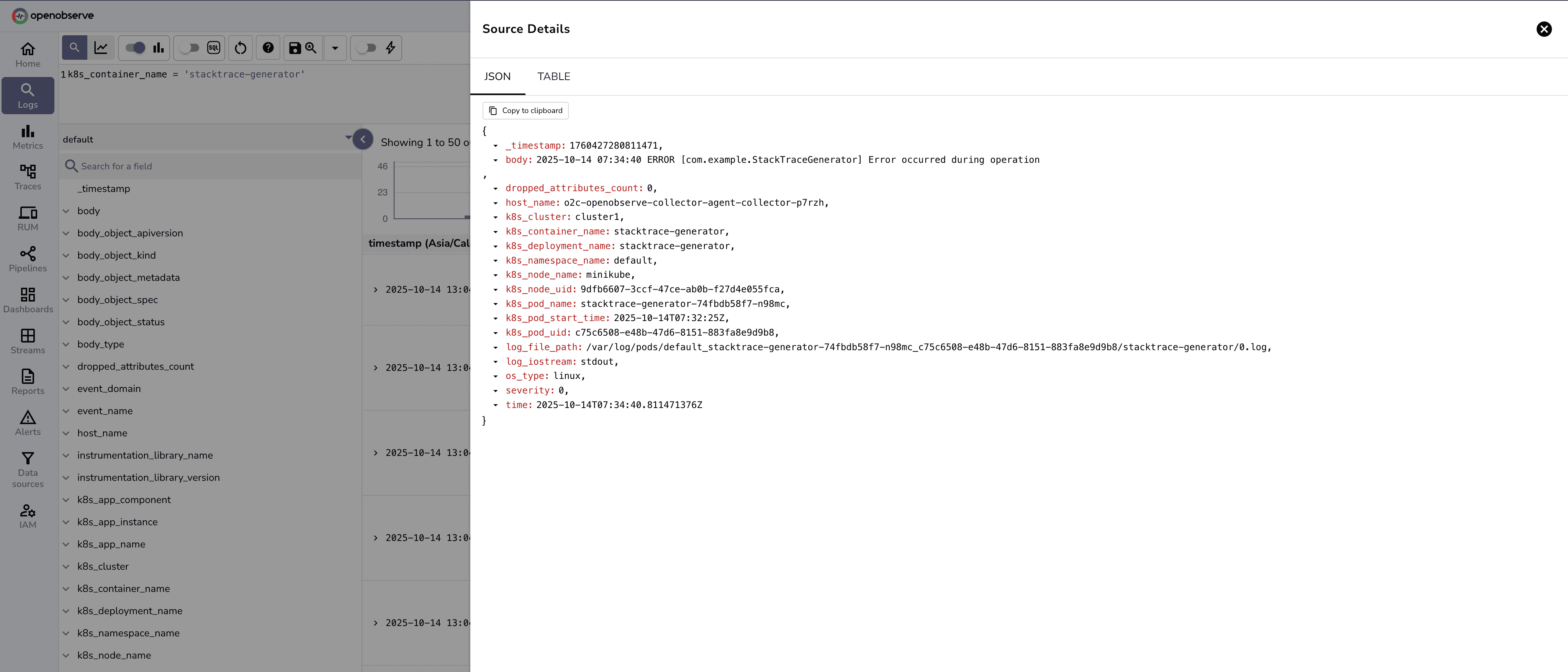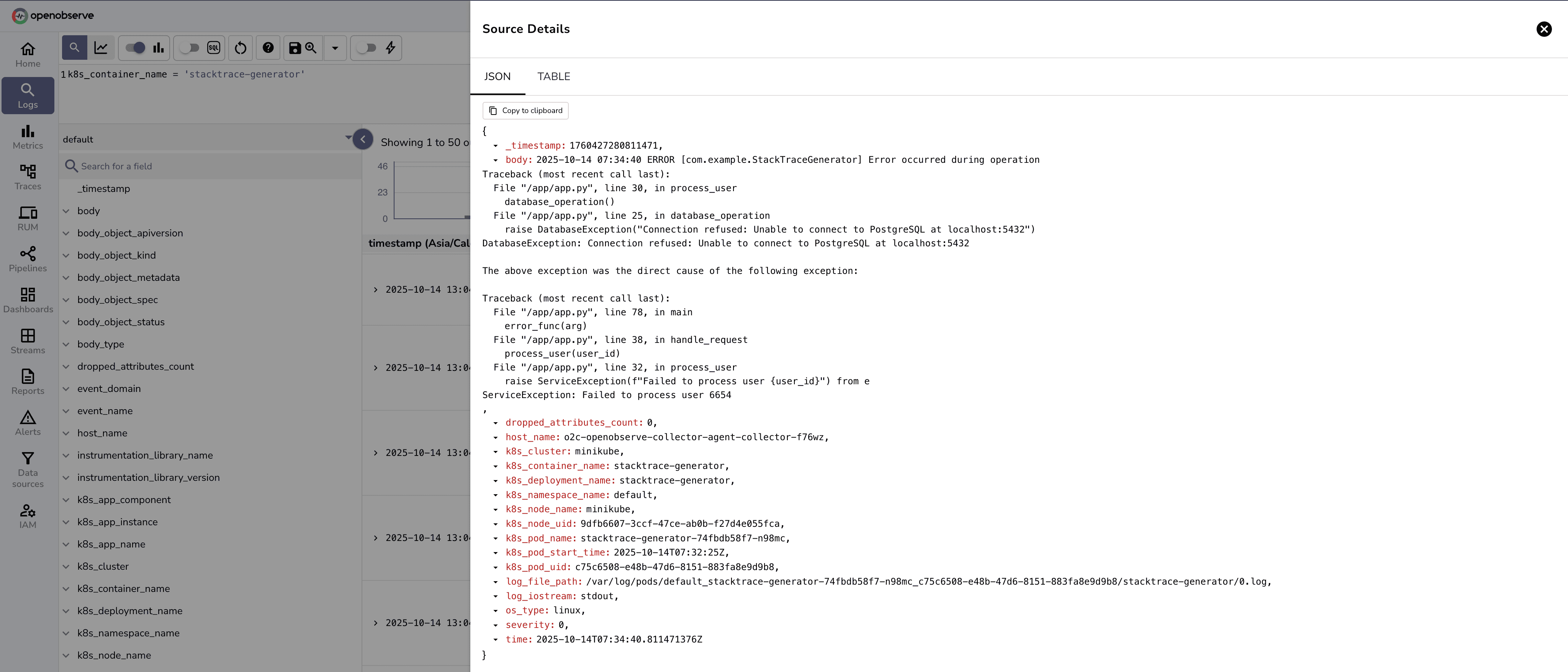How to Ingest Multi-Line Events in OpenObserve Using OpenObserve Collector


Try OpenObserve Cloud today for more efficient and performant observability.
Get Started For Free
OpenObserve Collector is a powerful data ingestion agent designed to collect, process, and forward logs, metrics, and traces to OpenObserve. Built on the OpenTelemetry Collector framework, it provides a flexible and scalable solution for handling various data sources and formats.
Key features:
Here's an example of a typical multi-line log event that includes a Python stack trace with chained exceptions:
2025-10-14 07:34:40 ERROR [com.example.StackTraceGenerator] Error occurred during operation
Traceback (most recent call last):
File "/app/app.py", line 30, in process_user
database_operation()
File "/app/app.py", line 25, in database_operation
raise DatabaseException("Connection refused: Unable to connect to PostgreSQL at localhost:5432")
DatabaseException: Connection refused: Unable to connect to PostgreSQL at localhost:5432
The above exception was the direct cause of the following exception:
Traceback (most recent call last):
File "/app/app.py", line 78, in main
error_func(arg)
File "/app/app.py", line 38, in handle_request
process_user(user_id)
File "/app/app.py", line 32, in process_user
raise ServiceException(f"Failed to process user {user_id}") from e
ServiceException: Failed to process user 6654
This log entry contains:
2025-10-14 07:34:40ERROR[com.example.StackTraceGenerator]Error occurred during operationMulti-stack trace events in applications often generate multi-line log entries where a single error or exception (e.g., a Python or Java stack trace) spans several lines, including file paths, line numbers, and nested exceptions. Without proper handling, these logs are fragmented, breaking context and complicating debugging.

This illustrates how a single log can be split across lines.

More log entries which shows further disconnection of related log data.


As depicted, nested logs split into separate entries resulting in loss of context while debugging.
When ingesting logs that span multiple lines (such as stack traces, JSON objects, or multi-line application logs), the default configuration may treat each line as a separate event. This results in:
What happens without multi-line configuration:
Without proper configuration, the sample log event shown in Section 2 would be split into 16+ separate log entries:
2025-10-14 07:34:40 ERROR [com.example.StackTraceGenerator] Error occurred during operationTraceback (most recent call last): File "/app/app.py", line 30, in process_user database_operation()This fragmentation makes it nearly impossible to understand the complete error context and troubleshoot issues effectively.
To enable multi-line event ingestion, you need to modify the OpenObserve Collector values.yaml file. The key is to configure the filelog receiver with a recombine operator.
For our sample log that starts with 2025-10-14 07:34:40 ERROR [com.example.StackTraceGenerator]..., we use the recombine operator that matches the timestamp format YYYY-MM-DD HH:MM:SS:
config:
receivers:
filelog:
include:
- /var/log/pods/*/*/*.log
start_at: beginning
operators:
- id: recombine
type: recombine
combine_field: body
source_identifier: attributes["log.file.path"]
is_first_entry: 'body matches "^\\d{4}-\\d{2}-\\d{2} \\d{2}:\\d{2}:\\d{2}"'
combine_with: "\n"
max_log_size: 102400
processors:
batch:
timeout: 10s
send_batch_size: 1000
exporters:
otlphttp:
endpoint: "http://your-openobserve-instance:5080/api/default"
headers:
Authorization: "Basic <your-auth-token>"
stream-name: "default"
service:
pipelines:
logs:
receivers: [filelog]
processors: [batch]
exporters: [otlphttp]
recombine combines multiple log entries into one2025-10-14 07:34:40\n)Here are different is_first_entry patterns for various log formats:
# Timestamp-based logs (YYYY-MM-DD HH:MM:SS) - Used in our example
is_first_entry: 'body matches "^\\d{4}-\\d{2}-\\d{2} \\d{2}:\\d{2}:\\d{2}"'
# ISO 8601 timestamp with brackets [2024-01-01T10:00:00]
is_first_entry: 'body matches "^\\[\\d{4}-\\d{2}-\\d{2}T\\d{2}:\\d{2}:\\d{2}"'
# Log level based (ERROR, WARN, INFO, DEBUG)
is_first_entry: 'body matches "^(ERROR|WARN|INFO|DEBUG)"'
# Java/Python stack traces (starts with Traceback or date)
is_first_entry: 'body matches "^(\\d{4}-\\d{2}-\\d{2}|Traceback)"'
# Custom format with date and log level
is_first_entry: 'body matches "^\\d{4}-\\d{2}-\\d{2}.*(ERROR|WARN|INFO|DEBUG)"'
# Edit your values.yaml file with the multi-line configuration
vi values.yaml
# For new installation:
helm install openobserve-collector openobserve/openobserve-collector \
-f values.yaml \
-n observability \
--create-namespace
# For upgrading existing installation:
helm upgrade openobserve-collector openobserve/openobserve-collector \
-f values.yaml \
-n observability
# Check pod status
kubectl get pods -n observability
# View collector logs
kubectl logs -f deployment/openobserve-collector -n observability
# Check for any errors
kubectl describe pod <collector-pod-name> -n observability
# Watch the rollout status
kubectl rollout status deployment/openobserve-collector -n observability
# Rollback to previous version if issues occur
helm rollback openobserve-collector -n observability
After deploying the changes, verify that the multi-line events are being properly ingested:

Before configuration (fragmented):
Each line appears as a separate log entry:
[Entry 1] 2025-10-14 07:34:40 ERROR [com.example.StackTraceGenerator] Error occurred during operation
[Entry 2] Traceback (most recent call last):
[Entry 3] File "/app/app.py", line 30, in process_user
[Entry 4] database_operation()
[Entry 5] File "/app/app.py", line 25, in database_operation
... (16+ separate entries)
After configuration (consolidated):
The entire stack trace appears as one log entry:
[Single Entry] 2025-10-14 07:34:40 ERROR [com.example.StackTraceGenerator] Error occurred during operation
Traceback (most recent call last):
File "/app/app.py", line 30, in process_user
database_operation()
File "/app/app.py", line 25, in database_operation
raise DatabaseException("Connection refused: Unable to connect to PostgreSQL at localhost:5432")
DatabaseException: Connection refused: Unable to connect to PostgreSQL at localhost:5432
The above exception was the direct cause of the following exception:
Traceback (most recent call last):
File "/app/app.py", line 78, in main
error_func(arg)
File "/app/app.py", line 38, in handle_request
process_user(user_id)
File "/app/app.py", line 32, in process_user
raise ServiceException(f"Failed to process user {user_id}") from e
ServiceException: Failed to process user 6654
Issue 1: Lines still appearing separately
is_first_entry expression matches your log format2025-10-14 07:34:40max_log_size value - increase if logs are being truncatedIssue 2: Collector pod crashes
kubectl logs <pod-name> -n observabilityIssue 3: Logs not appearing in OpenObserve
By configuring the OpenObserve Collector with multi-line support, you can significantly improve log readability and analysis. The recombine operator in the filelog receiver allows you to capture complex log entries that span multiple lines, providing better context and easier troubleshooting.
Remember to:
is_first_entry pattern with sample logsFor more information, visit the OpenObserve documentation and OpenTelemetry Collector documentation.

I'm a Solution Architect and Observability Engineer with over 10 years of experience helping organizations build resilient, transparent systems. As a Certified Splunk Consultant, I've spent my career turning data into actionable insights that drive real business outcomes. I'm passionate about open source observability tools and believe that robust monitoring is the foundation of modern infrastructure. I share practical strategies, lessons learned, and hands-on guidance from the trenches of enterprise observability